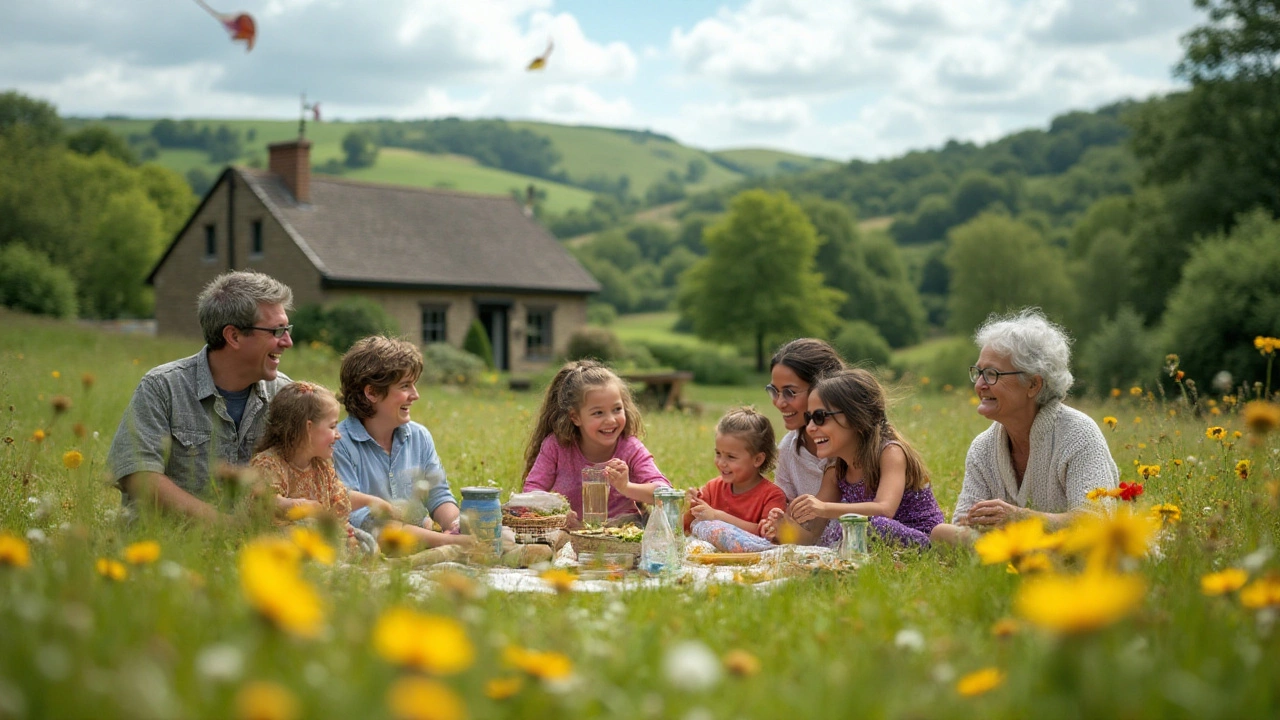Exploring Optional Outdoor Activities: Unleash the Adventure
 Dec, 14 2024
Dec, 14 2024
Outdoor activities have long been treasured for their ability to reconnect us with nature, provide physical exercise, and challenge our adventurous spirits. Opting for optional activities means embracing freedom and choice, selecting pursuits that align perfectly with our interests and lifestyle.
From peaceful walks through lush forests to high-adrenaline sports, the realm of optional outdoor activities is vast and varied. This exploration is not just about pushing limits but also about finding personal joy and satisfaction in simple pleasures.
Let's delve into the diverse world of outdoor options, where each activity opens up a new avenue for exploration and self-discovery, waiting for us to seize the day and embrace the beauty of the natural world around us.
- Understanding Optional Outdoor Activities
- Popular Activities to Consider
- Benefits of Engaging in Outdoor Sports
- Safety Tips for Outdoor Exploration
- Incorporating Nature into Daily Life
Understanding Optional Outdoor Activities
Engaging in optional outdoor activities is about embracing freedom and exploring pathways that bring joy and enrichment to our lives. While outdoor activities typically include structured sports or organized events, opting for ones labeled as 'optional' often signifies activities chosen according to personal interest, skill level, and availability. This flexibility allows exploration into diverse realms such as solo adventures, group excursions, or leisure beneath the open sky. These activities serve as avenues for self-discovery and respite, offering a unique blend of physical exertion and mental relaxation.
The nature of optional activities varies tremendously. Imagine setting out on a brisk hike through untouched trails where the air is fresh and each step brings forth a new sight. The experience can be as invigorating as it is meditative, forming a bond with the natural world that's forgotten in urban environments. Many people find solace in the simplicity of fishing by a quiet lake, where patience turns into reflection amidst the tranquil waters. Others may find the thrill of a challenging new sport such as rock climbing or paragliding to be the perfect antidote to daily routines. These activities offer an opportunity to test endurance, build resilience, and cultivate an appreciation for the beauty that exists beyond city limits.
What makes optional activities intriguing is how customizable they are. They adapt not just to personal preferences but also to changes in season, weather, and locale. You might find yourself exploring the depths of lush forests during the springtime or opting for snowshoeing in the winter months. The possibilities are as limitless as the imagination. Emphasizing personal choice allows one to step away from what is routine and discover passions that might otherwise remain dormant. In the words of John Muir, famed naturalist and advocate for the preservation of wilderness in the United States, "In every walk with nature, one receives far more than he seeks."
Data reveals that approximately 77% of Americans engage in outdoor activities each year, underscoring the growing recognition of their benefits. Why choose optional? The answer often lies in the pursuit of a balanced lifestyle. Nature offers a refuge where one can unplug from technology, breathe deeply, and find peace in unstructured, spontaneous play. With the hustle of everyday life, these moments provide necessary pauses, reducing stress levels and enhancing general well-being. By incorporating outdoor activities into regular schedules, individuals report increased happiness, improved fitness, and an enriched sense of community when participating with others.
Optional outdoor activities are not only for leisure but also for learning. Engaging in birdwatching can develop acute observation skills, while geocaching—a modern treasure hunt using a GPS—teaches navigation and problem-solving. Each outdoor pursuit has its rhythm and promise for learning something new or mastering a skill. This continuous learning brings a sense of achievement, especially when kindled by curiosity and passion, making optional outdoor activities a vital component of a fulfilling lifestyle.
Popular Activities to Consider
When it comes to outdoor activities, the options are as varied as the landscapes they take place in. If you are drawn to water like a moth to a flame, kayaking may be your go-to adventure. Whether meandering through serene lakes or tackling the twists and turns of a mountain river, this activity offers both serenity and excitement. It's a comprehensive workout for both the body and the soul, a rhythmic dance with the water that can soothe the mind while building core strength.
For those who prefer to keep their feet firmly on terra firma, hiking remains an ever-popular pastime. The world is dotted with trails that cater to all tastes, from the gentle paths winding through your local park to the challenging ascents of the world's most famous peaks. Hiking not only boosts cardiovascular health but also provides an incredible opportunity to witness wildlife and soak up the unique beauty of your surroundings.
If you are in search of something that gets the heart racing, rock climbing could be just the ticket. This quintessential adventure sport challenges both mental fortitude and physical prowess. Climbing requires focus, strength, and strategy, transforming the seemingly impossible into achievable goals. "Climbing is about making the impossible come true," says the renowned climber Alex Honnold. Each climb is a puzzle that demands attention and determination, offering rewards in the form of breathtaking views from the top.
And let us not forget the joys of cycling, particularly mountain biking, an activity that perfectly blends speed and skill. These bikes are specially designed with sturdy frames and thick tires to navigate uneven terrains. Biking provides a fantastic aerobic workout, letting you explore trails faster than on foot. Whether you are cruising through scenic countryside or tackling the dirt trails of a forest, the sense of freedom is unmatched. Many bike parks now offer beginner-friendly courses, making it accessible to all.
Camping, meanwhile, provides an experience that is less about action and more about slowing down and soaking in nature. Setting up a tent in a remote location and spending a night under the stars can be profoundly relaxing. The crackle of a campfire, the gentle rustling of leaves, the distant call of a night owl—it's a symphony of sounds that can reconnect us with the wilderness. Statistics suggest that camping not only reduces stress but enhances mood and improves mental clarity.
The world of optional outdoor activities is broad and welcoming, encouraging exploration and adventure at every turn. Whether you're paddling across a sun-dappled lake or breathing in the crisp mountain air, each activity invites you to step out of your comfort zone and into a world of possibility. So grab a map, lace up your boots, or snap on that helmet; the great outdoors is waiting for you to explore its treasures.

Benefits of Engaging in Outdoor Sports
When it comes to outdoor activities, choosing to participate in outdoor sports offers a multitude of benefits that extend beyond just physical fitness. One of the most immediate advantages is the opportunity to immerse oneself in natural environments, which can help alleviate the effects of modern life's stresses. Engaging in activities such as hiking, rock climbing, or mountain biking can significantly improve cardiovascular health, enabling better oxygen flow and heart function. Moreover, spending time outdoors has been linked to enhanced mental well-being, providing a natural mood boost through increased levels of serotonin and endorphins. By stepping outside, individuals can also benefit from exposure to sunlight, which is a natural source of Vitamin D, essential for bone health and immune function.
Outdoor sports also foster a deeper connection to the environment, urging participants to become more attuned to the rhythms of nature. This connection often inspires a sense of responsibility toward environmental conservation. Interestingly, being outdoors yields cognitive benefits as well, including improved concentration and creative thinking, attributed to the restorative and invigorating qualities of nature. According to a study published in the Journal of Environmental Psychology, spending even a short amount of time in natural settings can improve cognitive function and lower the risk of depression and anxiety.
Additionally, outdoor sports promote social interaction and teamwork, whether rowing with a group or participating in a soccer scrimmage in the park. These activities can strengthen relationships by building trust and fostering effective communication, essential skills both in sports and everyday life. Participation in team sports has even been shown in several studies to increase self-esteem and reduce feelings of loneliness, underlying the social significance of these shared experiences.
"Being active in nature not only enhances our physical health, but it significantly boosts our emotional resilience," says Dr. Susan Greenfield, a renowned neuroscientist and author.
It's essential to consider the comprehensive health benefits that engaging in outdoor activities can bring. Emerging research highlights the anti-aging benefits of regular physical activity in natural settings, slowing down the biological processes linked with age-related decline. Furthermore, these activities can gradually build stamina, strength, and agility, aiding in maintaining independence and quality of life as we age. For instance, kayaking on a serene lake or embarking on a challenging trail run can enhance muscular endurance while simultaneously offering a sense of accomplishment and joy.
To summarize, diving into the world of outdoor sports offers not just a path to physical wellness, but a holistic enhancement of life. It creates a space where individuals can explore their potential while appreciating the world's vast natural beauty. These experiences collectively enrich our lives, providing both immediate satisfaction and long-term benefits that go beyond the surface, encouraging a lifestyle that is healthier, more fulfilling, and deeply interconnected with the natural world.
Safety Tips for Outdoor Exploration
Exploring the great outdoors is a rewarding pastime that connects us to nature and offers a break from daily life's hustle and bustle. While these adventures can be invigorating, ensuring your safety should always be a top priority. Proper preparation plays a crucial role in transforming an ordinary outing into a thrilling yet safe journey. Knowing your environment is the first step to safety. It’s essential to research the area you plan to explore, including potential weather conditions, wildlife, and the terrain. Equipping yourself with a reliable map or a GPS device is also vital. Understanding the geography will aid in navigation, ensuring you won't stray off your planned path. As tempting as off-trail exploration may sound, adhering to designated paths reduces the risk of getting lost and minimizes environmental impact.
Outfitting yourself with the right gear is another pillar of safety. Depending on the activity and climate, your attire should be both functional and comfortable. Layering clothing can help you adjust to fluctuating temperatures. Having waterproof and windproof layers is particularly useful. Hydration and nutrition should not be overlooked. Packing sufficient water and high-energy snacks can help maintain energy levels. A well-stocked first aid kit, coupled with basic knowledge of administering first aid, could prove invaluable in emergencies. Safety gear should be appropriate to the activity, such as helmets for biking or climbing and buoyancy aids for watersports.
Having an emergency plan can spell the difference between a mishap and a disaster. Always inform someone you trust about your plans, including your expected return time and route. Understanding how to reach emergency services or the park rangers is crucial in remote areas. If you're venturing into remote areas or unpredictable weather zones, consider carrying a personal locator beacon or a satellite phone. It enables communication when cell signals are unavailable. Being informed and cautious doesn’t mean you can’t have fun, but it ensures any adventure is both exhilarating and secure.
"The wilderness holds answers to more questions than we have yet learned to ask." – Nancy Newhall
Respecting nature is not just an ethical practice but also a safety measure. Avoid touching or feeding wildlife. It not only protects them but also keeps you safe from potential harm. Be mindful of local regulations surrounding camping or fire building. Leaving no trace is a principle that keeps the environment pristine and safe for future visitors. Educational resources are abundant for those eager to learn more. Numerous courses cover survival skills, first aid, and navigation, bolstering both confidence and competence for outdoor enthusiasts. Embracing lifelong learning in these areas does more than safeguard your journey; it enriches your relationship with nature itself.

Incorporating Nature into Daily Life
Embracing the outdoors doesn't necessarily mean embarking on grand adventures every weekend. Instead, it can be about finding simple yet meaningful ways to integrate nature into our everyday routines. This approach not only enhances mental well-being but also invites a deeper appreciation for our environment, which is crucial in the hustle and bustle of modern living. Studies show that even brief interactions with green spaces can significantly elevate mood, reduce stress, and improve cognitive function. Think of moments like having your morning coffee on the balcony or taking a leisurely walk in a nearby park as little doses of nature that enrich the daily grind. When these small acts accumulate, they form a powerful, rejuvenating practice.
One way to truly make nature a part of your life is through gardening. Whether you have a sprawling backyard or just a windowsill, planting and nurturing greenery can be immensely satisfying. It connects us with the cycles of growth and teaches patience and care. You could opt for herbs that spice up your dishes or vibrant flowers that bring color and joy to your indoor spaces. Research published in the Journal of Health Psychology indicates that gardening can indeed lower cortisol levels, a hormone associated with stress, thereby promoting a calmer outlook throughout the day.
"The garden suggests there might be a place where we can meet nature halfway," Wendell Berry once remarked, encapsulating the profound impact of finding balance with the earth.
Creating Outdoor Routines
Developing outdoor routines can seamlessly weave nature's serenity into your lifestyle. Consider starting your day with a short jog or yoga session in a local park. This not only invigorates your body but also allows you to connect with the rhythm of nature. Another idea is an afternoon break outdoors—perhaps a fifteen-minute escapade where outdoor activities like bird watching or simply soaking up the sun become part of your daily schedule. By interrupting sedentary patterns with such purposeful interactions, you counteract the negative effects of prolonged indoor confinement, something especially beneficial for remote workers. Breathe in the fresh air, observe the sky, and relish the simplicity of existence outside four walls. It’s a gentle reminder that life brims with beauty beyond screens and schedules.
Bringing the Outdoors In
If stepping outside regularly is a challenge, consider inviting nature indoors. Houseplants are more than decorative additions; they purify the air and create a calming atmosphere. Species like the snake plant or peace lily require minimal maintenance yet significantly impact indoor environment quality. Establish spaces in your home designated for relaxation surrounded by natural elements—wooden furniture, natural light, stones, or water features. This ambient transformation can enhance tranquility and offer a mental escape right within your abode. Once nature becomes an integral part of indoor settings, it enriches your personal space with vitality and warmth. In this way, even city dwellers can enjoy the benefits nature offers, regardless of the urban sprawl.